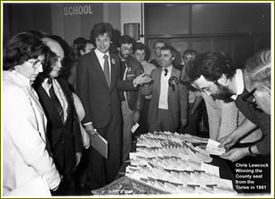Difference between revisions of "Electoral Registers and Poll Books"
Darksecretz (talk | contribs) |
Darksecretz (talk | contribs) |
||
| Line 23: | Line 23: | ||
Poll books were published from 1696 right through to 1871. Lists of people were published, together with how they voted. Poll books often also contain their qualification for being able to vote, together with the address of the person. In general, one had to be a freeholder in order to vote, i.e. an owner of land or property.<br> | Poll books were published from 1696 right through to 1871. Lists of people were published, together with how they voted. Poll books often also contain their qualification for being able to vote, together with the address of the person. In general, one had to be a freeholder in order to vote, i.e. an owner of land or property.<br> | ||
<br><br> | <br><br> | ||
| − | Back to [[ | + | Back to [[Records Office Guide]] |
Latest revision as of 17:06, 25 September 2022
Contents
Electoral Rolls
Electoral Rolls or Registers are lists of individuals who are entitled to vote.
Electoral registration was introduced in 1832 and after 1885 most adult males over the age of 21 are included, and from 1918 most women over 30.
From 1928, all adults could vote in all elections. In 1970, the age of eligibility was reduced to 18.
Registers will be held by the Local Studies Library or Record Office for the area you wish to search. They are very helpful in listing the presence of individuals and their addresses, though other personal details are not given and children are not listed. They are only searchable by address and not by name.
Registration was suspended in both World Wars and there are no registers for 1916 and 1917 (1915-17 in Scotland) and from 1940 to 1944 inclusive.
Under the Data Protection Act of 1998, registers are now less accessible from 2002 onwards, where voters have the option of being listed seperately in a flagged list.
Poll Books
Poll books were published from 1696 right through to 1871. Lists of people were published, together with how they voted. Poll books often also contain their qualification for being able to vote, together with the address of the person. In general, one had to be a freeholder in order to vote, i.e. an owner of land or property.
Back to Records Office Guide
